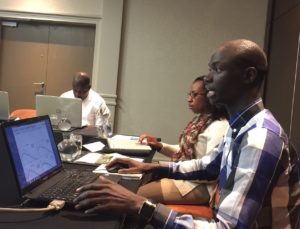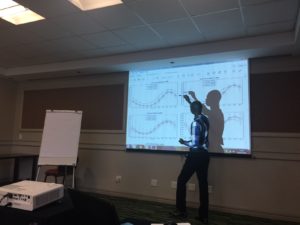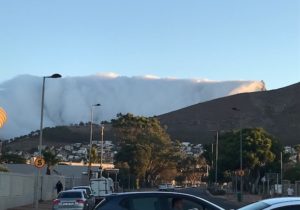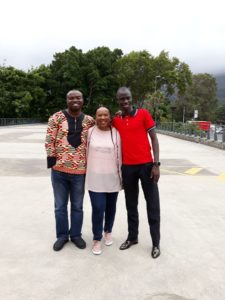CORDEX-Africa Phase 2 – Activities for 2015 – 2017
Given funding opportunities, activities in CORDEX-Africa will include (a) the further assessment of downscaled reanalysis data for both model evaluation and climate process understanding, (b) analysis of downscaled CMIP5 GCM data to assess potential changes in regional climate, (c) continued engagement of communities that need climate information to distill the implications of climatic changes at their regional scales and (d) the continued development of human capacity in the climate science, climate services and end-user communities.
Proposed activities for themes (a) and (b) above take the form of a series of six workshops, modeled on previous CORDEX-Africa workshops, each with distinct objectives and goals. The content of these workshops is described below. Proposed activities for theme (c) do not form part of this document but are briefly mentioned at the end of the document for context and theme (d) follows in all activities.
Workshops in the CORDEX-Africa analysis Phase 2 campaign
Workshop 1 – Completed May 2015
The focus of this workshop is primarily to identify key regional research questions and develop/adopt methodologies that address these. It is not a workshop where data analysis is performed and would include only senior regional team members. This workshop will set the research agenda of the next three workshops and would likely consist of the following components:
- Reconstitution of regional analysis teams
- Identification/elucidation of key regional specific climate questions
- Identification of processes (local and remote) that need to be assessed to address the questions in (2) above
- Development of further evaluation period research questions and analytical focus
- Development of scientific research questions/analyses for projection data
- Initial discussion of papers that will be written through the workshop activities
- Proposal of potential CORDEX high resolution “pilot regions”
- Provision of climate data to the regional teams
Click here to access the notes and ideas from the inception workshop.
Workshop 2 – Completed 16-20 November 2015
This goals of this workshop were an initial analysis of CORDEX-Africa data based on the questions elucidated in the first workshop. Full teams, including young scientists, met at the University of Cape Town for this workshop to address the following goals:
1. Establish understanding of CORDEX activities globally as well as CORDEX-Africa
2. Formal establishment of regional analysis teams.
3. Review of scientific research questions/analyses from the preliminary workshop
4. Establish analysis themes and working titles for the papers that will be written through the workshop activities
5. Preliminary analysis of data
6. Proposal of potential CORDEX ‘Flagship Pilot Regions’ studies
7. Establish commitments until the next workshop
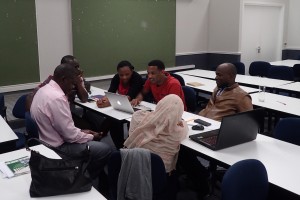
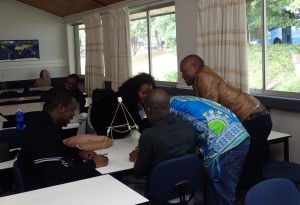
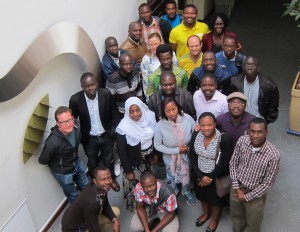
Each of the four regional teams developed ideas for at least three papers with focus on i) understanding physical process, ii) evaluation of ability of global and regional climate models to simulate processes relevant for each regions and iii) analysis of future climate projections. A common thread running through these three themes is an assessment of the added value downscaling brings to each. Special attention was also given to the inclusion of impact modellers in the analysis strategy and on providing climate information to the user community. An additional VIA team emerged from this meeting whose focus would be using CORDEX-Africa data in impacts models to assess the climate impact on themes like health, agriculture, water resources, energy and infrastructure. So we now have four regional teams whose primary focus is the analysis of climate data and a 5th VIA team who are concerned with the application of the climate data in societally relevant sectors.
Almost all CORDEX-Africa simulation data available in November 2015 and a number of observational data sets were collected before the workshop and distributed to the regional teams on external disks (about 6 Tb of data each).
Workshop 3 – Completed 8-12 February 2016
The third workshop in the CORDEX-Africa Analysis Campaign Phase 2 series was held at the University of Cape Town between the 8th and 12th of February 2016. The week-long workshop was well attended by about 25 participants representing all four CORDEX Africa regions i.e. West, Central, Eastern, and Southern Africa. The goals of the meeting were to build on the research questions developed at the 2nd analysis workshop, refine the proposed paper ideas and come up with proposals for the CORDEX Flagship Pilot Studies. the following objectives were addressed:
1. Review of scientific research questions/analyses from the November 2015 workshop
2. Refinement of paper structures
3. Analysis of data
4. Proposal of potential CORDEX ‘Flagship Pilot Regions’ studies for submission
5. Positioning CORDEX Africa within the IPCC AR6 vision
6. Think about future funders to approach to continue the workshops
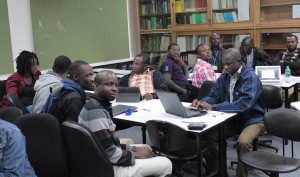
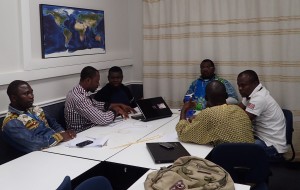
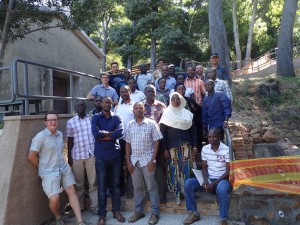
By the end of the meeting, lead authors emerged to coordinate the writing of not less than twelve starting publications combined from all regional teams. The planned papers cover topics ranging from model evaluation, regional dynamics to climate change projections and vulnerability impact assessment studies. Furthermore participant groups developed regional work plans for the next 6-8 months which gave time lines for various milestones of the paper writing effort. There were also discussions on securing funding to continue the workshops into 2016 and 2017, with a writeshop proposed for the latter part of 2016.
In addition to the work, we also enjoyed a trip around the Cape Peninsula to take in some of the beauty Cape Town offers.
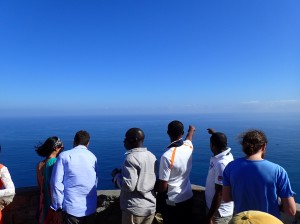
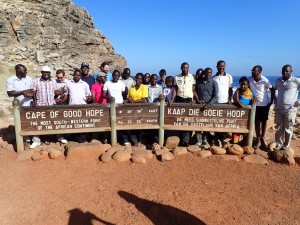
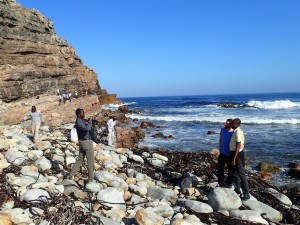
Workshop 4 – Completed August 2017, funded by the Government of Sweden through Sida
This workshop was planned to refine the research questions, methodologies of data analysis and develop key figures for the papers discussed in the February 2016 Workshop 2. However, we decided instead to develop and write papers that could be considered in the IPCC special report on 1.5 degrees of global warming (IPCC SR1.5). Altogether 7 papers were developed and have been submitted to a Focus Collection of Environmental Research Letters journal. The workshop and subsequent submissions was a tremendous example of how the four CORDEX-Africa teams could respond to a pressing knowledge need in a relatively short period of time. Review comments will be addressed in the next two workshops in December 2017 and February 2018 as appropriate. A short summary of the workshop activities is here.
Workshop 5 – Completed November 2017, funded by the Government of Sweden through Sida
This workshop is specifically for the VIA group in CORDEX-Africa. To date no papers on VIA topics have emerged so a dedicated workshop is planned to facilitate building a strong team able to used CORDEX-Africa data in applied contexts. Objectives for this workshop included
- The development of themes the team would like to address (e.g. health, agriculture, water resources, energy, ecology)
- An identification of leaders to champion each theme
- Elucidating important questions in the themes
- Identify impact models that might be employed and and what climate data would be needed
- Development of papers that would emerge from this work
This team has a critical role to fill through the integration of climate data for vulnerability-impact-adaptation activities and in bridging the science-society divide through transforming climate data to actionable information (the “I” and “A” in the CORDEX-Africa ethos). It is therefore highly desirable to develop our capacity in this group through the provision of a sustainable and coordinated framework in which to conduct this type these activities. This workshop was held at the University of Cape Town and the workshop report is available here.
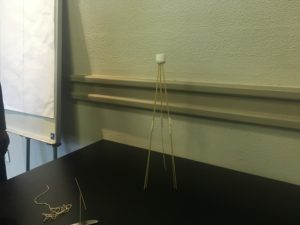
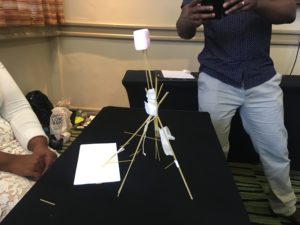
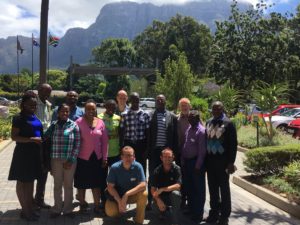
Workshop 6 – Completed December 2017, funded by the Government of Sweden through Sida
This workshop served as a platform for final data analysis where results from the two previous workshops are consolidated and any emergent questions from previous workshops will be addressed. The goal of this workshop was to have a clearly defined research question for each planned paper and set of analysis products that could be used in the final paper writing workshop in February 2018. Themes addressed included
- Final refinement of research questions
- Final data analysis
- Decisions on section and authorship responsibilities
- Selection of journals to target
- Continued training in climate analysis techniques and tools
A short report of activities engaged in during the workshop is available here
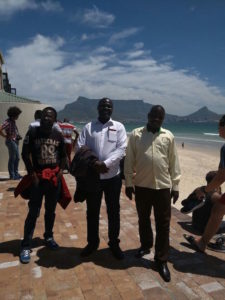
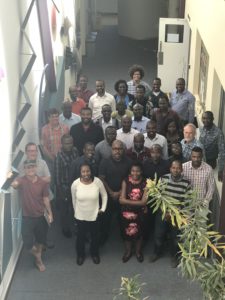
Workshop 6a – Held in February 2018, funded by the Government of Sweden through Sida
This workshop, held in Cape Town, served as a writing workshop (a “writeshop”) where key team members spent five days together to (a) finalise the corrections to the 1.5 degree papers submitted in October 2017 and resubmit them and (b) continue to work on the papers developed at the December 2017 workshop through the formulation of the Introduction, Methods and Conclusion sections. This workshop also had a training/development aspect for members of groups who have not authored a journal paper. In the previous phase of CORDEX-Africa the “writeshop” was hailed to be a critically important component of the whole process and this 2018 writeshop proved to once again be monumentally important. We have successfully published 6 papers in a special issue of Environmental Research Letters.
1. Lennard C, Nikulin G, Dosio A and Moufouma-Okia W (2018) On the need for regional climate information over Africa under varying levels of global warming, Environ. Res. Lett., doi:10.1088/1748-9326/aab37b, http://iopscience.iop.org/article/10.1088/1748-9326/aab2b4
2. Nikulin G, Lennard C, Dosio A, Kjellström E, Chen Y, Hänsler A, Kupiainen M, Laprise R, Mariotti L, Fox Maule C, van Meijgaard E, Panitz H-J, Scinocca J F and Somot S (2018) The effects of 1.5 and 2 degrees of global warming on Africa in the CORDEX ensemble, Environ. Res. Lett., doi:10.1088/1748-9326/aab2b4, http://iopscience.iop.org/article/10.1088/1748-9326/aab1b1
3. Klutse N A B, Ajayi V, Gbobaniyi E O, Egbebiyi T S, Kouadio K, Nkrumah F, Quagraine K A, Olusegun C, Diasso U J, Abiodun B J, Lawal K A A, Nikulin G, Lennard C and Dosio A (2018) Potential impact of 1.5°C and 2°C global warming on consecutive dry and wet days over West Africa, Environ. Res. Lett., doi:10.1088/1748-9326/aab37b, http://iopscience.iop.org/article/10.1088/1748-9326/aab37b
4. Maure G A, Pinto I, Ndebele-Murisa M R, Muthige M, Lennard C, Nikulin G, Dosio A and Meque A O (2018) The southern African climate under 1.5° and 2°C of global warming as simulated by CORDEX models, Environ. Res. Lett., doi:10.1088/1748-9326/aab190, http://iopscience.iop.org/article/10.1088/1748-9326/aab190
5. Pokam Mba W, Longandjo G-N, Moufouma-Okia W, Bell J P, James R, Vondou D A D, Haensler A, Fotso Nguemo T C, Guenang G M, Djiotang Tchotchou A L, Kamsu-Tamo P H, Takong R R, Nikulin G, Lennard C and Dosio A (2018)Consequences of 1.5°C and 2°C global warming levels for temperature and precipitation changes over Central Africa, Environ. Res. Lett., doi:10.1088/1748-9326/aab048, http://iopscience.iop.org/article/10.1088/1748-9326/aab048
6. Osima S, Indasi V, Zaroug M, Edris H, Gudoshava M, Misiani H, Nimusiima A, Anyah R, Otieno G, Ogwang B, Jain S, Kondowe A, Mwangi E, Lennard C, Nikulin G, Dosio A (2018) Projected Climate over the Greater Horn of Africa under 1.5 °С and 2°С global warming, Environ. Res. Lett., doi: 10.1088/1748-9326/aaba1b ,http://iopscience.iop.org/article/10.1088/1748-9326/aaba1b
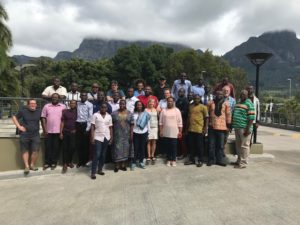
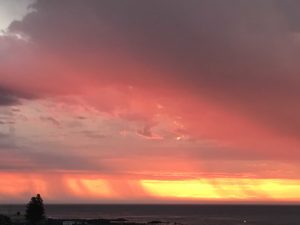
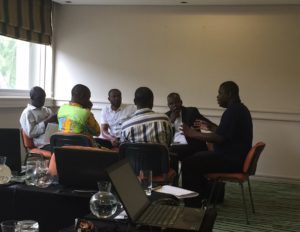
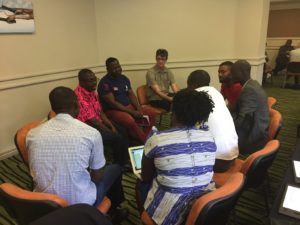
Congratulations to all the teams for their hard work and we look forward to the next set or papers currently being worked on. Here is a short report from that workshop.
Workshop 6b – Held in February 2018, funded by the Government of Sweden through Sida
This workshop served as the second VIA workshop for CORDEX-Africa. The workshop served to revisit the research questions developed during the November 2017 workshop and develop a work plan to achieve the analysis and paper submission goals of each group. Each VIA thematic team has developed a paper outline and assigned roles to team members:
(1) the health group are investigating the impact of climate change on malaria;
(2) the hydrology group investigating the impact of a warming climate on hydropower potential and
(3) the agriculture group investigating the impact of a warming climate on maize productivity over Africa.
All groups are using CORDEX data in their analyses. During the workshop each team presented their analysis plans and the work they have already done for internal review.
The workshop ran in parallel with the writeshop and we used the opportunity to develop very successful regional collaborations between the climate and VIA groups as each VIA paper now has a climate science representation to assist in data provision and analysis. A short summary of the workshop can be seen here.
Workshops 7 and 8 – Engagement of users of climate information
An initial proposed activity in the user-engagement component of CORDEX-Africa would include a follow-up workshop with delegates of the five-cities workshop mentioned above. The workshop would further explore city scale vulnerabilities to climate stressors and examine potential adaptation and mitigation options on decadal to climate change time scales. These workshops would be developed in close collaboration with partners from Global Change System for Analysis and Training (START), with whom CSAG has a very good relationship, and other such organizations as appropriate.
3. Summary
These five workshop are likely to produce between 10-15 academic publications that enhance both the current understanding of climate processes over Africa and as well potential changes in these as a result of a warming climate. This information is critical for the downstream understanding of the potential impacts of climate variability and change in many sectors of society such as agriculture, health, infrastructure and ecosystem services and development of appropriate mitigation and adaptation responses. The engagement of impact modellers in these workshops will likely deliver materials that are useful to user communities.
These workshops also help attain the key CORDEX-Africa goal of development of young scientists within Africa. As a testament to this, all of the journal articles published through the CORDEX-Africa initiative to date have been first-authored by either early career scientists or students. The development of young African scientists forms a major pillar of the initiative.
